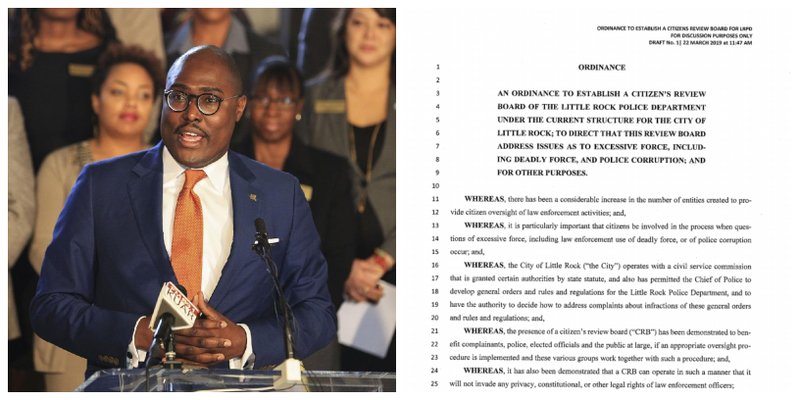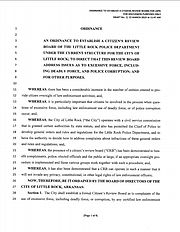A first look at a proposed independent citizen review board in Little Rock shows a five-member body with some investigative powers that would address instances of corruption and use of excessive force, including deadly force, in the Police Department.
A draft ordinance from the city attorney's office obtained under the Arkansas Freedom of Information Act lays out a possible structure for a civilian oversight panel, something Mayor Frank Scott Jr. started pushing for before he took office Jan. 1.
A Little Rock review board could be the first of its kind in the state. There are more than 100 civilian review boards in municipalities nationwide, and their powers and structures vary, according to the National Association for Civilian Oversight of Law Enforcement.
Scott first called for an independent review board during the campaign leading to his election on Dec. 4. He repeated the proposal after a Little Rock officer fatally shot 30-year-old Bradley Blackshire on Feb. 22.
According to the draft ordinance, the board would review investigations at the request of the mayor, city board, city manager or police chief. The process would begin after an investigation's conclusion -- including exoneration -- is reached.
The board would have five members. Three would be appointed by the mayor and one would be a community representative who is involved in neighborhood activities, according to the draft.
The fifth would be a representative of the business community and selected from nominations by groups such as the Little Rock Regional Chamber of Commerce or other business associations.
Members should be representative of the city's demographics, the draft states. They would serve three-year terms, with three of the initial members serving one- or two-year terms.
The city would provide staffing for the review board, which could mean employing at least one person with relevant skills or expertise. The board also would be provided with information from the Police Department regarding any case the department investigates.
After its review, the panel would provide its findings and recommendations to the mayor, city manager and chief of police. Those leaders would then have a week to consider whether additional review by the Police Department is required or whether a different decision should be considered.
The civilian review board would have the authority to conduct public hearings, take testimony, hire a court reporter and review any physical evidence.
An ordinance forming a review board would be subject to approval by the city Board of Directors. At the end of the day Friday, the matter was not listed on the board's Tuesday agenda that is available online.
In a memo to Scott's senior adviser, Kendra Pruitt, City Attorney Tom Carpenter said the draft is "extremely rough" and does not address a number of issues.
He noted that many of the elements the draft outlines are subject to change upon further review, including the number of board members, the lengths of their terms, the nature of the review permitted and whether members are required to have any specialized training.
In the draft, Carpenter said in the memo, he suggested that the review board get involved with cases where action is taken by the department against an officer before the civil service commission does.
Little Rock's civil service commission is made up of seven residents who are responsible for overseeing personnel disputes, promotions, and regulation or policy violations involving the fire and police departments. In recent months, many commission meetings have focused on hearing officers contesting suspensions or other disciplinary actions.
Other police departments in the state, including North Little Rock, Fort Smith and Fayetteville, are also overseen by civil service commissions.
Civilian review boards can provide external oversight, represent residents' concerns and use leverage to advocate for change, Trisha Rhodes, an assistant professor of criminology and criminal justice at the University of Arkansas at Little Rock, said in an email.
It's rare that review boards can force a police department to make a certain decision, Rhodes added.
Some in the Little Rock department see such a board as redundant, including Fraternal Order of Police president Ronnie Morgan.
"Right now, our position as the FOP is we already have a citizen review board, and it's called the civil service commission," Morgan said Friday. "The civil service commission, it works both ways. It works for the citizen and the police officer. Police can appeal, and if a citizen is not happy, they can also appeal ... the mechanisms are already in place -- whether they're being used or not, I don't know."
When Scott repeated his call for a civilian review board, some city directors said they'd be inclined to support it but wanted more details.
Ken Richardson, the Ward 2 representative, said he believed a review board, if established, should not just be symbolic. It could be one way to help a fractured relationship between residents and police.
"It's a good idea, but it has to have some teeth," Richardson said in an interview earlier this month. "A lot of times, we put these things in place just to say we have these things in place."
Activist Dawn Jeffrey said she would support a review board, but it would be important to appoint people to it who were representative of the community.
There are four types of review boards, Carpenter wrote in his memo. One type has civilians investigate allegations of police misconduct and make recommendations. Another has the department investigate allegations and make findings, but allows the board to review the findings and recommend to the police chief whether they should be accepted to rejected.
Another sets up the review board as an appellate body for residents to review departmental findings and make recommendations. A fourth type sets up the board as an auditor that investigates the process by which a department accepts and investigates a complaint and reports on the thoroughness and fairness of the process to both the department and the public.
In the memo, Carpenter noted that he created the draft ordinance in consultation with newly selected Police Chief Keith Humphrey, who will take over the department next month. Humphrey kick-started a civilian review board in Norman, Okla., where he was previously chief of police. Humphrey's preference, Carpenter said, is a board that is a combination of auditor and investigator.
A Section on 03/30/2019

